|
A* Pathfinding Project
3.6
The A* Pathfinding Project for Unity 3D
|
|
A* Pathfinding Project
3.6
The A* Pathfinding Project for Unity 3D
|
Generates a grid of nodes. More...
Generates a grid of nodes.
The GridGraph does exactly what the name implies, generates nodes in a grid pattern.
Grid graphs suit well to when you already have a grid based world. Features:
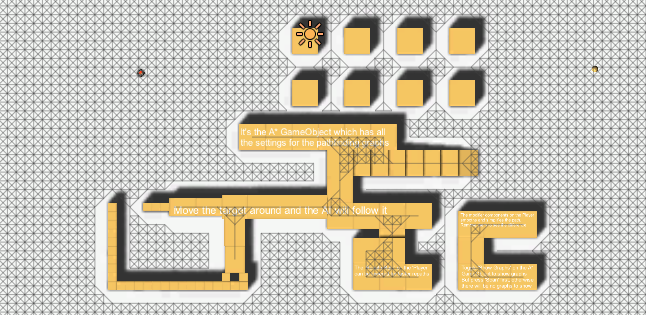
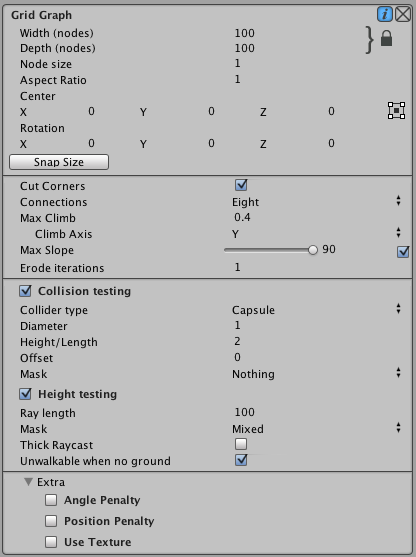
The The Snap Size button snaps the internal size of the graph to exactly contain the current number of nodes, i.e not contain 100.3 nodes but exactly 100 nodes.
This will make the "center" coordinate more accurate.
The Graph During Runtime Any graph which implements the IUpdatableGraph interface can be updated during runtime.
For grid graphs this is a great feature since you can update only a small part of the grid without causing any lag like a complete rescan would.
If you for example just have instantiated a sphere obstacle in the scene and you want to update the grid where that sphere was instantiated, you can do this:
Where ob is the obstacle you just instantiated (a GameObject).
As you can see, the UpdateGraphs function takes a Bounds parameter and it will send an update call to all updateable graphs.
A grid graph will update that area and a small margin around it equal to collision testing diameter/2
Configure using script
Classes | |
| class | TextureData |
| Used for using a texture as a source for a grid graph. More... | |
Public Member Functions | |
| GridGraph () | |
| virtual void | CalculateConnections (GridNode[] nodes, int x, int z, GridNode node) |
| Calculates the grid connections for a single node. | |
| GraphUpdateThreading | CanUpdateAsync (GraphUpdateObject o) |
| bool | CheckConnection (GridNode node, int dir) |
| Returns if node is connected to it's neighbour in the specified direction. | |
| override void | DeserializeExtraInfo (GraphSerializationContext ctx) |
| Deserializes graph type specific node data. | |
| virtual void | ErodeWalkableArea () |
| Erodes the walkable area. | |
| virtual void | ErodeWalkableArea (int xmin, int zmin, int xmax, int zmax) |
| Erodes the walkable area. | |
| void | GenerateMatrix () |
| Generates the matrix used for translating nodes from grid coordinates to world coordintes. | |
| void | GetBoundsMinMax (Bounds b, Matrix4x4 matrix, out Vector3 min, out Vector3 max) |
| Calculates minimum and maximum points for bounds b when multiplied with the matrix. | |
| uint | GetConnectionCost (int dir) |
| override NNInfo | GetNearest (Vector3 position, NNConstraint constraint, GraphNode hint) |
| override NNInfo | GetNearestForce (Vector3 position, NNConstraint constraint) |
| GridNode | GetNodeConnection (GridNode node, int dir) |
| Int3 | GetNodePosition (int index, int yOffset) |
| override void | GetNodes (GraphNodeDelegateCancelable del) |
| Calls a delegate with all nodes in the graph. | |
| List< GraphNode > | GetNodesInArea (Bounds b) |
| All nodes inside the bounding box. | |
| List< GraphNode > | GetNodesInArea (GraphUpdateShape shape) |
| All nodes inside the shape. | |
| bool | HasNodeConnection (GridNode node, int dir) |
| bool | HasNodeConnection (int index, int x, int z, int dir) |
| virtual bool | IsValidConnection (GridNode n1, GridNode n2) |
| Returns true if a connection between the adjacent nodes n1 and n2 is valid. | |
| bool | Linecast (Vector3 _a, Vector3 _b) |
| Returns if there is an obstacle between origin and end on the graph. | |
| bool | Linecast (Vector3 _a, Vector3 _b, GraphNode hint) |
| Returns if there is an obstacle between origin and end on the graph. | |
| bool | Linecast (Vector3 _a, Vector3 _b, GraphNode hint, out GraphHitInfo hit) |
| Returns if there is an obstacle between origin and end on the graph. | |
| bool | Linecast (Vector3 _a, Vector3 _b, GraphNode hint, out GraphHitInfo hit, List< GraphNode > trace) |
| Returns if there is an obstacle between origin and end on the graph. | |
| override void | OnDestroy () |
| This function will be called when this graph is destroyed. | |
| override void | OnDrawGizmos (bool drawNodes) |
| void | OnPostScan (AstarPath script) |
| Auto links grid graphs together. | |
| override void | PostDeserialization () |
| Called after all deserialization has been done for all graphs. | |
| void | RemoveGridGraphFromStatic () |
| override void | ScanInternal (OnScanStatus statusCallback) |
| Scans the graph, called from AstarPath.ScanInternal Override this function to implement custom scanning logic The statusCallback may be optionally called to show progress info in the editor | |
| override void | SerializeExtraInfo (GraphSerializationContext ctx) |
| Serializes graph type specific node data. | |
| void | SetNodeConnection (GridNode node, int dir, bool value) |
| void | SetNodeConnection (int index, int x, int z, int dir, bool value) |
| Set if connection in the specified direction should be enabled. | |
| virtual void | SetUpOffsetsAndCosts () |
| Sets up neighbourOffsets with the current settings. | |
| bool | SnappedLinecast (Vector3 _a, Vector3 _b, GraphNode hint, out GraphHitInfo hit) |
| Returns if _b is visible from _a on the graph. | |
| void | UpdateArea (GraphUpdateObject o) |
| Internal function to update an area of the graph. | |
| void | UpdateAreaInit (GraphUpdateObject o) |
| virtual void | UpdateNodePositionCollision (GridNode node, int x, int z, bool resetPenalty=true) |
| Updates position, walkability and penalty for the node. | |
| void | UpdateSizeFromWidthDepth () |
| Updates size from width, depth and nodeSize values. | |
 Public Member Functions inherited from NavGraph Public Member Functions inherited from NavGraph | |
| virtual void | Awake () |
| This will be called on the same time as Awake on the gameObject which the AstarPath script is attached to. | |
| virtual int | CountNodes () |
| Count nodes in the graph. | |
| virtual void | CreateNodes (int number) |
| Creates a number of nodes with the correct type for the graph. | |
| NNInfo | GetNearest (Vector3 position) |
| Returns the nearest node to a position using the default NNConstraint. | |
| NNInfo | GetNearest (Vector3 position, NNConstraint constraint) |
| Returns the nearest node to a position using the specified NNConstraint. | |
| virtual Color | NodeColor (GraphNode node, PathHandler data) |
| virtual void | RelocateNodes (Matrix4x4 oldMatrix, Matrix4x4 newMatrix) |
| Relocates the nodes in this graph. | |
| void | SafeOnDestroy () |
| SafeOnDestroy should be used when there is a risk that the pathfinding is searching through this graph when called. | |
| void | Scan () |
| void | ScanGraph () |
| Consider using AstarPath.Scan () instead since this function might screw things up if there is more than one graph. | |
| void | ScanInternal () |
| void | SetMatrix (Matrix4x4 m) |
| Use to set both matrix and inverseMatrix at the same time. | |
 Public Member Functions inherited from IUpdatableGraph Public Member Functions inherited from IUpdatableGraph | |
| GraphUpdateThreading | CanUpdateAsync (GraphUpdateObject o) |
| void | UpdateArea (GraphUpdateObject o) |
| Updates an area using the specified GraphUpdateObject. | |
| void | UpdateAreaInit (GraphUpdateObject o) |
 Public Member Functions inherited from IRaycastableGraph Public Member Functions inherited from IRaycastableGraph | |
| bool | Linecast (Vector3 start, Vector3 end) |
| bool | Linecast (Vector3 start, Vector3 end, GraphNode hint) |
| bool | Linecast (Vector3 start, Vector3 end, GraphNode hint, out GraphHitInfo hit) |
| bool | Linecast (Vector3 start, Vector3 end, GraphNode hint, out GraphHitInfo hit, List< GraphNode > trace) |
Static Public Member Functions | |
| static void | CalculateConnections (GridNode node) |
| Calculates the grid connections for a single node. | |
 Static Public Member Functions inherited from NavGraph Static Public Member Functions inherited from NavGraph | |
| static bool | InSearchTree (GraphNode node, Path path) |
| Returns if the node is in the search tree of the path. | |
Public Attributes | |
| Matrix4x4 | boundsMatrix |
| Matrix4x4 | boundsMatrix2 |
| const int | getNearestForceOverlap = 2 |
| In GetNearestForce, determines how far to search after a valid node has been found. | |
| readonly uint[] | neighbourCosts = new uint[8] |
| Costs to neighbour nodes. | |
| readonly int[] | neighbourOffsets = new int[8] |
| Index offset to get neighbour nodes. | |
| readonly int[] | neighbourXOffsets = new int[8] |
| Offsets in the X direction for neighbour nodes. | |
| readonly int[] | neighbourZOffsets = new int[8] |
| Offsets in the Z direction for neighbour nodes. | |
| GridNode[] | nodes |
| All nodes in this graph. | |
| int | scans = 0 |
| Vector2 | size |
| Size of the grid. | |
 Public Attributes inherited from NavGraph Public Attributes inherited from NavGraph | |
| byte[] | _sguid |
| Used to store the guid value. | |
| AstarPath | active |
| Reference to the AstarPath object in the scene. | |
| bool | drawGizmos = true |
| uint | graphIndex |
| Index of the graph, used for identification purposes. | |
| bool | infoScreenOpen |
| Used in the editor to check if the info screen is open. | |
| uint | initialPenalty = 0 |
| Matrix4x4 | inverseMatrix |
| Inverse of matrix. | |
| Matrix4x4 | matrix |
| A matrix for translating/rotating/scaling the graph. | |
| string | name |
| bool | open |
| Is the graph open in the editor | |
Protected Attributes | |
| int[] | corners |
| To reduce memory allocations this array is reused. | |
Properties | |
| int | Depth [get, set] |
| virtual bool | uniformWidthDepthGrid [get] |
| This is placed here so generators inheriting from this one can override it and set it to false. | |
| int | Width [get, set] |
 Properties inherited from NavGraph Properties inherited from NavGraph | |
| Guid | guid [get, set] |
| Used as an ID of the graph, considered to be unique. | |
Private Member Functions | |
| GridNode | GetNodeConnection (int index, int x, int z, int dir) |
| Get the connecting node from the node at (x,z) in the specified direction. | |
| List< GraphNode > | GetNodesInArea (Bounds b, GraphUpdateShape shape) |
| All nodes inside the shape or if null, the bounding box. | |
Inspector - Settings | |
| bool | useRaycastNormal [get] |
| Use heigh raycasting normal for max slope calculation. | |
| int | width |
| Width of the grid in nodes. | |
| int | depth |
| Depth (height) of the grid in nodes. | |
| float | aspectRatio = 1F |
| Scaling of the graph along the X axis. | |
| float | isometricAngle = 0 |
| Angle to use for the isometric projection. | |
| Vector3 | rotation |
| Rotation of the grid in degrees. | |
| Bounds | bounds |
| Vector3 | center |
| Center point of the grid. | |
| Vector2 | unclampedSize |
| Size of the grid. | |
| float | nodeSize = 1 |
| Size of one node in world units. | |
| GraphCollision | collision |
| Settings on how to check for walkability and height. | |
| float | maxClimb = 0.4F |
| The max position difference between two nodes to enable a connection. | |
| int | maxClimbAxis = 1 |
| The axis to use for maxClimb. | |
| float | maxSlope = 90 |
| The max slope in degrees for a node to be walkable. | |
| int | erodeIterations = 0 |
| Erosion of the graph. | |
| bool | erosionUseTags = false |
| Use tags instead of walkability for erosion. | |
| int | erosionFirstTag = 1 |
| Tag to start from when using tags for erosion. | |
| bool | autoLinkGrids = false |
| Auto link the graph's edge nodes together with other GridGraphs in the scene on Scan. | |
| float | autoLinkDistLimit = 10F |
| Distance limit for grid graphs to be auto linked. | |
| NumNeighbours | neighbours = NumNeighbours.Eight |
| Number of neighbours for each node. | |
| bool | cutCorners = true |
| If disabled, will not cut corners on obstacles. | |
| float | penaltyPositionOffset = 0 |
| Offset for the position when calculating penalty. | |
| bool | penaltyPosition = false |
| Use position (y-coordinate) to calculate penalty. | |
| float | penaltyPositionFactor = 1F |
| Scale factor for penalty when calculating from position. | |
| bool | penaltyAngle = false |
| float | penaltyAngleFactor = 100F |
| How much penalty is applied depending on the slope of the terrain. | |
| float | penaltyAnglePower = 1 |
| How much extra to penalize very steep angles. | |
| bool | useJumpPointSearch = false |
| TextureData | textureData = new TextureData () |
| Holds settings for using a texture as source for a grid graph. | |
| GridGraph | ( | ) |
|
static |
Calculates the grid connections for a single node.
Convenience function, it's faster to use CalculateConnections(GridNode[],int,int,node) but that will only show when calculating for a large number of nodes
Calculates the grid connections for a single node.
| GraphUpdateThreading CanUpdateAsync | ( | GraphUpdateObject | o | ) |
| bool CheckConnection | ( | GridNode | node, |
| int | dir | ||
| ) |
Returns if node is connected to it's neighbour in the specified direction.
This will also return true if neighbours = NumNeighbours.Four, the direction is diagonal and one can move through one of the adjacent nodes to the targeted node.
|
virtual |
Deserializes graph type specific node data.
Reimplemented from NavGraph.
Reimplemented in LayerGridGraph.
|
virtual |
Erodes the walkable area.
|
virtual |
Erodes the walkable area.
xmin, zmin (inclusive)
xmax, zmax (exclusive)
Reimplemented in LayerGridGraph.
| void GenerateMatrix | ( | ) |
Generates the matrix used for translating nodes from grid coordinates to world coordintes.
| void GetBoundsMinMax | ( | Bounds | b, |
| Matrix4x4 | matrix, | ||
| out Vector3 | min, | ||
| out Vector3 | max | ||
| ) |
Calculates minimum and maximum points for bounds b when multiplied with the matrix.
| uint GetConnectionCost | ( | int | dir | ) |
|
virtual |
Reimplemented from NavGraph.
Reimplemented in LayerGridGraph.
|
virtual |
Reimplemented from NavGraph.
Reimplemented in LayerGridGraph.
|
private |
| Int3 GetNodePosition | ( | int | index, |
| int | yOffset | ||
| ) |
|
virtual |
Calls a delegate with all nodes in the graph.
This is the primary way of "looping" through all nodes in a graph.
This function should not change anything in the graph structure.
Implements NavGraph.
Reimplemented in LayerGridGraph.
| List<GraphNode> GetNodesInArea | ( | Bounds | b | ) |
All nodes inside the bounding box.
| List<GraphNode> GetNodesInArea | ( | GraphUpdateShape | shape | ) |
All nodes inside the shape.
|
private |
All nodes inside the shape or if null, the bounding box.
If a shape is supplied, it is assumed to be contained inside the bounding box.
| bool HasNodeConnection | ( | GridNode | node, |
| int | dir | ||
| ) |
| bool HasNodeConnection | ( | int | index, |
| int | x, | ||
| int | z, | ||
| int | dir | ||
| ) |
Returns true if a connection between the adjacent nodes n1 and n2 is valid.
Also takes into account if the nodes are walkable
| bool Linecast | ( | Vector3 | _a, |
| Vector3 | _b | ||
| ) |
Returns if there is an obstacle between origin and end on the graph.
This is not the same as Physics.Linecast, this function traverses the graph and looks for collisions.
| bool Linecast | ( | Vector3 | _a, |
| Vector3 | _b, | ||
| GraphNode | hint | ||
| ) |
Returns if there is an obstacle between origin and end on the graph.
| [in] | _a | Point to linecast from |
| [in] | _b | Point to linecast to |
| [in] | hint | If you have some idea of what the start node might be (the one close to _a), pass it to hint since it can enable faster lookups This is not the same as Physics.Linecast, this function traverses the graph and looks for collisions.
|
| bool Linecast | ( | Vector3 | _a, |
| Vector3 | _b, | ||
| GraphNode | hint, | ||
| out GraphHitInfo | hit | ||
| ) |
Returns if there is an obstacle between origin and end on the graph.
| [in] | _a | Point to linecast from |
| [in] | _b | Point to linecast to |
| [out] | hit | Contains info on what was hit, see GraphHitInfo |
| [in] | hint | If you have some idea of what the start node might be (the one close to _a), pass it to hint since it can enable faster lookups This is not the same as Physics.Linecast, this function traverses the graph and looks for collisions.
|
| bool Linecast | ( | Vector3 | _a, |
| Vector3 | _b, | ||
| GraphNode | hint, | ||
| out GraphHitInfo | hit, | ||
| List< GraphNode > | trace | ||
| ) |
Returns if there is an obstacle between origin and end on the graph.
| [in] | _a | Point to linecast from |
| [in] | _b | Point to linecast to |
| [out] | hit | Contains info on what was hit, see GraphHitInfo |
| [in] | hint | If you have some idea of what the start node might be (the one close to _a), pass it to hint since it can enable faster lookups |
| trace | If a list is passed, then it will be filled with all nodes the linecast traverses This is not the same as Physics.Linecast, this function traverses the graph and looks for collisions.
|
|
virtual |
This function will be called when this graph is destroyed.
Reimplemented from NavGraph.
Reimplemented in LayerGridGraph.
|
virtual |
Reimplemented from NavGraph.
Reimplemented in LayerGridGraph.
| void OnPostScan | ( | AstarPath | script | ) |
|
virtual |
Called after all deserialization has been done for all graphs.
Can be used to set up more graph data which is not serialized
Reimplemented from NavGraph.
Reimplemented in LayerGridGraph.
| void RemoveGridGraphFromStatic | ( | ) |
|
virtual |
Scans the graph, called from AstarPath.ScanInternal Override this function to implement custom scanning logic The statusCallback may be optionally called to show progress info in the editor
Implements NavGraph.
Reimplemented in LayerGridGraph.
|
virtual |
Serializes graph type specific node data.
This function can be overriden to serialize extra node information (or graph information for that matter) which cannot be serialized using the standard serialization. Serialize the data in any way you want and return a byte array. When loading, the exact same byte array will be passed to the DeserializeExtraInfo function.
These functions will only be called if node serialization is enabled.
Reimplemented from NavGraph.
Reimplemented in LayerGridGraph.
| void SetNodeConnection | ( | GridNode | node, |
| int | dir, | ||
| bool | value | ||
| ) |
| void SetNodeConnection | ( | int | index, |
| int | x, | ||
| int | z, | ||
| int | dir, | ||
| bool | value | ||
| ) |
Set if connection in the specified direction should be enabled.
Note that bounds checking will still be done when getting the connection value again, so it is not necessarily true that HasNodeConnection will return true just because you used SetNodeConnection on a node to set a connection to true.
| index | Index of the node |
| x | X coordinate of the node |
| z | Z coordinate of the node |
| value | Enable or disable the connection |
|
virtual |
Sets up neighbourOffsets with the current settings.
neighbourOffsets, neighbourCosts, neighbourXOffsets and neighbourZOffsets are set up.
The cost for a non-diagonal movement between two adjacent nodes is RoundToInt (nodeSize * Int3.Precision)
The cost for a diagonal movement between two adjacent nodes is RoundToInt (nodeSize * Sqrt (2) * Int3.Precision)
| bool SnappedLinecast | ( | Vector3 | _a, |
| Vector3 | _b, | ||
| GraphNode | hint, | ||
| out GraphHitInfo | hit | ||
| ) |
Returns if _b is visible from _a on the graph.
This function is different from the other Linecast functions since it 1) snaps the start and end positions directly to the graph and it uses Bresenham's line drawing algorithm as opposed to the others which use sampling at fixed intervals. If you only care about if one node can see another node, then this function is great, but if you need more precision than one node, use the normal linecast functions
| [in] | _a | Point to linecast from |
| [in] | _b | Point to linecast to |
| [out] | hit | Contains info on what was hit, see GraphHitInfo |
| [in] | hint | If you have some idea of what the start node might be (the one close to _a), pass it to hint since it can enable faster lookups |
This is not the same as Physics.Linecast, this function traverses the graph and looks for collisions.
| void UpdateArea | ( | GraphUpdateObject | o | ) |
Internal function to update an area of the graph.
| void UpdateAreaInit | ( | GraphUpdateObject | o | ) |
|
virtual |
Updates position, walkability and penalty for the node.
Assumes that collision.Initialize (...) has been called before this function
| void UpdateSizeFromWidthDepth | ( | ) |
Updates size from width, depth and nodeSize values.
Also generates a new matrix .
| float aspectRatio = 1F |
Scaling of the graph along the X axis.
This should be used if you want different scales on the X and Y axis of the grid
| float autoLinkDistLimit = 10F |
Distance limit for grid graphs to be auto linked.
| bool autoLinkGrids = false |
Auto link the graph's edge nodes together with other GridGraphs in the scene on Scan.
| Bounds bounds |
| Matrix4x4 boundsMatrix |
| Matrix4x4 boundsMatrix2 |
| Vector3 center |
Center point of the grid.
| GraphCollision collision |
Settings on how to check for walkability and height.
|
protected |
To reduce memory allocations this array is reused.
Used in the CalculateConnections function
| bool cutCorners = true |
If disabled, will not cut corners on obstacles.
If connections is Eight, obstacle corners might be cut by a connection, setting this to false disables that.
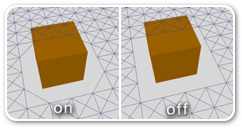
| int depth |
Depth (height) of the grid in nodes.
| int erodeIterations = 0 |
Erosion of the graph.
The graph can be eroded after calculation. This means a margin is put around unwalkable nodes or other unwalkable connections. It is really good if your graph contains ledges where the nodes without erosion are walkable too close to the edge.
Below is an image showing a graph with erode iterations 0, 1 and 2

| int erosionFirstTag = 1 |
Tag to start from when using tags for erosion.
| bool erosionUseTags = false |
Use tags instead of walkability for erosion.
Tags will be used for erosion instead of marking nodes as unwalkable. The nodes will be marked with tags in an increasing order starting with the tag erosionFirstTag. Debug with the Tags mode to see the effect. With this enabled you can in effect set how close different AIs are allowed to get to walls using the Valid Tags field on the Seeker component.
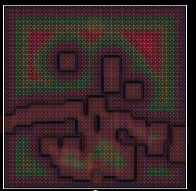
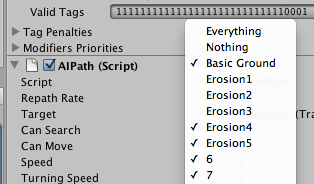
| const int getNearestForceOverlap = 2 |
In GetNearestForce, determines how far to search after a valid node has been found.
| float isometricAngle = 0 |
Angle to use for the isometric projection.
If you are making a 2D isometric game, you may want to use this parameter to adjust the layout of the graph to match your game. This will essentially scale the graph along one of its diagonals to produce something like this:
A perspective view of an isometric graph.
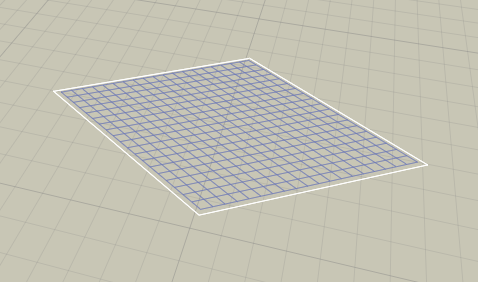
A top down view of an isometric graph. Note that the graph is entirely 2D, there is no perspective in this image.
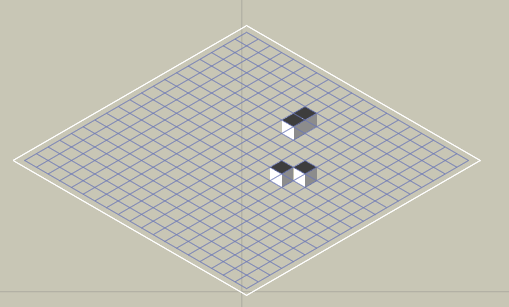
Usually the angle that you want to use is either 30 degrees (alternatively 90-30 = 60 degrees) or atan(1/sqrt(2)) which is approximately 35.264 degrees (alternatively 90 - 35.264 = 54.736 degrees). You might also want to rotate the graph plus or minus 45 degrees around the Y axis to get the oritientation required for your game.
You can read more about it on the wikipedia page linked below.
| float maxClimb = 0.4F |
The max position difference between two nodes to enable a connection.
Set to 0 to ignore the value.
| int maxClimbAxis = 1 |
The axis to use for maxClimb.
X = 0, Y = 1, Z = 2.
| float maxSlope = 90 |
The max slope in degrees for a node to be walkable.
| readonly uint [] neighbourCosts = new uint[8] |
Costs to neighbour nodes.
| readonly int [] neighbourOffsets = new int[8] |
Index offset to get neighbour nodes.
Added to a node's index to get a neighbour node index
| NumNeighbours neighbours = NumNeighbours.Eight |
Number of neighbours for each node.
Either four directional or eight directional
| readonly int [] neighbourXOffsets = new int[8] |
Offsets in the X direction for neighbour nodes.
Only 1, 0 or -1
| readonly int [] neighbourZOffsets = new int[8] |
Offsets in the Z direction for neighbour nodes.
Only 1, 0 or -1
| GridNode [] nodes |
All nodes in this graph.
| float nodeSize = 1 |
Size of one node in world units.
| bool penaltyAngle = false |
| float penaltyAngleFactor = 100F |
How much penalty is applied depending on the slope of the terrain.
At a 90 degree slope (not that exactly 90 degree slopes can occur, but almost 90 degree), this penalty is applied. At a 45 degree slope, half of this is applied and so on. Note that you may require very large values, a value of 1000 is equivalent to the cost of moving 1 world unit.
| float penaltyAnglePower = 1 |
How much extra to penalize very steep angles.
| bool penaltyPosition = false |
Use position (y-coordinate) to calculate penalty.
| float penaltyPositionFactor = 1F |
Scale factor for penalty when calculating from position.
| float penaltyPositionOffset = 0 |
Offset for the position when calculating penalty.
| Vector3 rotation |
Rotation of the grid in degrees.
| int scans = 0 |
| Vector2 size |
| TextureData textureData = new TextureData () |
Holds settings for using a texture as source for a grid graph.
Texure data can be used for fine grained control over how the graph will look. It can be used for positioning, penalty and walkability control.
Below is a screenshot of a grid graph with a penalty map applied. It has the effect of the AI taking the longer path along the green (low penalty) areas.
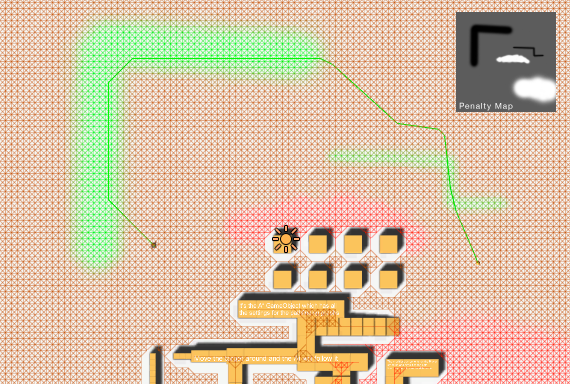
| Vector2 unclampedSize |
Size of the grid.
Might be negative or smaller than nodeSize
| bool useJumpPointSearch = false |
| int width |
Width of the grid in nodes.
|
getset |
|
get |
This is placed here so generators inheriting from this one can override it and set it to false.
If it is true, it means that the nodes array's length will always be equal to width*depth It is used mainly in the editor to do auto-scanning calls, setting it to false for a non-uniform grid will reduce the number of scans
|
get |
Use heigh raycasting normal for max slope calculation.
True if maxSlope is less than 90 degrees.
|
getset |